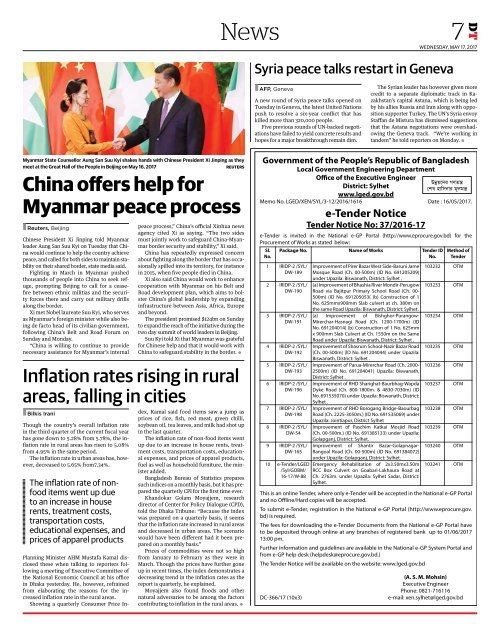e_Paper, Wednesday, May 17, 2017
Create successful ePaper yourself
Turn your PDF publications into a flip-book with our unique Google optimized e-Paper software.
News 7<br />
WEDNESDAY, MAY <strong>17</strong>, 20<strong>17</strong><br />
Syria peace talks restart in Geneva<br />
DT<br />
• AFP, Geneva<br />
A new round of Syria peace talks opened on<br />
Tuesday in Geneva, the latest United Nations<br />
push to resolve a six-year conflict that has<br />
killed more than 320,000 people.<br />
Five previous rounds of UN-backed negotiations<br />
have failed to yield concrete results and<br />
hopes for a major breakthrough remain dim.<br />
The Syrian leader has however given more<br />
credit to a separate diplomatic track in Kazakhstan’s<br />
capital Astana, which is being led<br />
by his allies Russia and Iran along with opposition<br />
supporter Turkey. The UN’s Syria envoy<br />
Staffan de Mistura has dismissed suggestions<br />
that the Astana negotiations were overshadowing<br />
the Geneva track. “We’re working in<br />
tandem” he told reporters on Monday. •<br />
Myanmar State Counsellor Aung San Suu Kyi shakes hands with Chinese President Xi Jinping as they<br />
meet at the Great Hall of the People in Beijing on <strong>May</strong> 16, 20<strong>17</strong><br />
REUTERS<br />
China offers help for<br />
Myanmar peace process<br />
• Reuters, Beijing<br />
Chinese President Xi Jinping told Myanmar<br />
leader Aung San Suu Kyi on Tuesday that China<br />
would continue to help the country achieve<br />
peace, and called for both sides to maintain stability<br />
on their shared border, state media said.<br />
Fighting in March in Myanmar pushed<br />
thousands of people into China to seek refuge,<br />
prompting Beijing to call for a ceasefire<br />
between ethnic militias and the security<br />
forces there and carry out military drills<br />
along the border.<br />
Xi met Nobel laureate Suu Kyi, who serves<br />
as Myanmar’s foreign minister while also being<br />
de facto head of its civilian government,<br />
following China’s Belt and Road Forum on<br />
Sunday and Monday.<br />
“China is willing to continue to provide<br />
necessary assistance for Myanmar’s internal<br />
peace process,” China’s official Xinhua news<br />
agency cited Xi as saying. “The two sides<br />
must jointly work to safeguard China-Myanmar<br />
border security and stability,” Xi said.<br />
China has repeatedly expressed concern<br />
about fighting along the border that has occasionally<br />
spilled into its territory, for instance<br />
in 2015, when five people died in China.<br />
Xi also said China would work to enhance<br />
cooperation with Myanmar on his Belt and<br />
Road development plan, which aims to bolster<br />
China’s global leadership by expanding<br />
infrastructure between Asia, Africa, Europe<br />
and beyond.<br />
The president promised $124bn on Sunday<br />
to expand the reach of the initiative during the<br />
two day summit of world leaders in Beijing.<br />
Suu Kyi told Xi that Myanmar was grateful<br />
for Chinese help and that it would work with<br />
China to safeguard stability in the border. •<br />
Inflation rates rising in rural<br />
areas, falling in cities<br />
• Bilkis Irani<br />
Though the country’s overall inflation rate<br />
in the third quarter of the current fiscal year<br />
has gone down to 5.28% from 5.78%, the inflation<br />
rate in rural areas has risen to 5.08%<br />
from 4.95% in the same period.<br />
The inflation rate in urban areas has, however,<br />
decreased to 5.65% from7.34%.<br />
The inflation rate of nonfood<br />
items went up due<br />
to an increase in house<br />
rents, treatment costs,<br />
transportation costs,<br />
educational expenses, and<br />
prices of apparel products<br />
Planning Minister AHM Mustafa Kamal disclosed<br />
these when talking to reporters following<br />
a meeting of Executive Committee of<br />
the National Economic Council at his office<br />
in Dhaka yesterday. He, however, refrained<br />
from elaborating the reasons for the increased<br />
inflation rate in the rural areas.<br />
Showing a quarterly Consumer Price Index,<br />
Kamal said food items saw a jump as<br />
prices of rice, fish, red meat, green chilli,<br />
soybean oil, tea leaves, and milk had shot up<br />
in the last quarter.<br />
The inflation rate of non-food items went<br />
up due to an increase in house rents, treatment<br />
costs, transportation costs, educational<br />
expenses, and prices of apparel products,<br />
fuel as well as household furniture, the minister<br />
added.<br />
Bangladesh Bureau of Statistics prepares<br />
such indices on a monthly basis, but it has prepared<br />
the quarterly CPI for the first time ever.<br />
Khandokar Golam Moyajjem, research<br />
director of Center for Policy Dialogue (CPD),<br />
told the Dhaka Tribune: “ Because the index<br />
was prepared on a quarterly basis, it seems<br />
that the inflation rate increased in rural areas<br />
and decreased in urban areas. The scenario<br />
would have been different had it been prepared<br />
on a monthly basis.”<br />
Prices of commodities were not so high<br />
from January to February as they were in<br />
March. Though the prices have further gone<br />
up in recent times, the index demonstrates a<br />
decreasing trend in the inflation rates as the<br />
report is quarterly, he explained.<br />
Moyajjem also found floods and other<br />
natural adversaries to be among the factors<br />
contributing to inflation in the rural areas. •


















